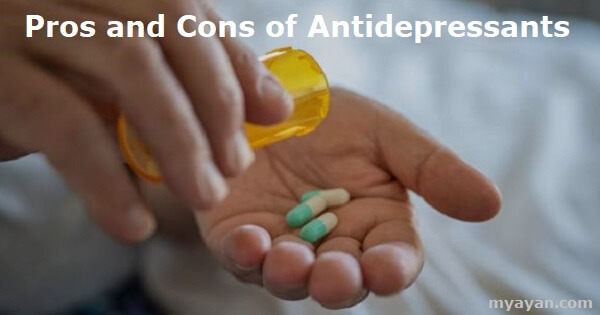Anxiety and depression are the main reasons behind people take antidepressants. According to recent data from Johns Hopkins Medicine, around 26% of Americans aged 18 or above suffer from different forms of depression. In simple words, anxiety and depression affect 1 in every four adults in the US. While some view them as crucial, others have contradictory opinions about their efficacy. If you've recently been to a psychiatrist, you must be prescribed an antidepressant. But before you take one for your condition, it's essential to go through the pros and cons of antidepressants first.
There are different drugs available for patients depending on the severity of depression. It's worth noticing that these drugs may not provide relief instantly. But there are certain advantages of antidepressants that you should notice within a week of taking them. These include:
How your mood depends on the level of neurotransmitters in the brain namely, Serotonin, Norepinephrine, and Dopamine. These chemicals act as messengers between brain cells. When these chemicals are imbalanced, you feel depressed.
So, antidepressants work by balancing the levels of these chemicals and help you better your emotions and behavior. By balancing your chemicals, the symptoms of depression are reduced and hence your mood improves.
There is a direct link between neurotransmitters and fatigue. When you take antidepressants, they interact with the imbalanced chemicals elevating your mood. This results in feeling energetic. You'll no longer feel overwhelmed or exhausted all the time since your body will be able to better handle stress and its associated emotions.
People also benefit from improved concentration when they take antidepressants regularly as it helps improve focus and clarity of thought.
Serotonin and Dopamine are known to affect hunger and craving sensations. By increasing these levels, antidepressants may help reduce cravings for certain foods or increase feelings of satiety after eating. Antidepressant medications act on the hypothalamus, a region of the brain that helps regulate hunger and satiety. By influencing activity within this area, antidepressants can strongly impact how much food you feel like eating and when you feel full.
There is a strong link between restlessness and depression. When you feel depressed, you cannot sleep People with chronic depression often develop insomnia and other sleep-related disorders. When the levels of neurotransmitters are balanced more effectively, you tend to improve your sleeping patterns better. Moreover, some antidepressants have sedative effects that can also contribute to better sleep hygiene.
Antidepressants evidently provide many benefits to patients suffering from anxiety or depression. However, there can be certain disadvantages of taking antidepressants for longer periods. These include:
The medications can have several side effects which are common and usually vanish after a few weeks. The side effects including nausea, dry mouth, drowsiness, headaches, and dizziness may start affecting you within a week of your medication. If you feel any symptoms during the medication, consult your healthcare provider immediately.
Over time, regular use of antidepressants can lead to developing a physical or psychological dependency on the drug. This means you may experience withdrawal symptoms when trying to stop taking them. Therefore, it is important to consult with your doctor regularly about any changes in the medication regimen. It’s always better to discuss any concerns about developing a dependency on the drug.
Many people on antidepressants experience decreased sex drive or inability to orgasm due to increased serotonin levels. This affects both men and women differently depending on their medication.
Another common side effect is gaining weight which can happen if you take certain medications for extended periods. This can lead to low self-esteem and further depression in some cases.
Depending on the type of medication prescribed, treatments with antidepressants can sometimes be expensive for patients without insurance coverage. Additionally, generic forms of some drugs may not always be available or covered under certain health plans.
Conclusion
Antidepressants can benefit some of you in alleviating symptoms of mental health disorders. They should not be perceived as a cure-all pill, however. You must do proper research on the type of drug you are prescribed and the severity of your mental condition. It’s better safe than sorry; so do consult your psychiatrist to avoid any side effects and long-term implications. Overall, proceed with caution regarding antidepressants, as they are not an ideal solution for tackling all mental health issues. After all, everyone's needs are different, so be aware of yours and take action accordingly.

If you're struggling with depression, medication paired with counseling can aid you in returning to a normal lifestyle. However, if your symptoms are mild, simply adjusting your way of life and seeking counseling may suffice. It's important to remember that there's no need to feel embarrassed about taking antidepressants.
Antidepressants can assist with emotional balance, alleviate symptoms such as restlessness, anxiety, and suicidal thoughts, and improve sleep by treating depression.
According to a study, the long-term use of antidepressants may not necessarily improve one's quality of life. The researchers suggest that the benefits of antidepressants over an extended period are uncertain.
If depression is not treated, individuals may be more likely to engage in risky behaviors such as drug or alcohol addiction. It can also damage relationships, affect job performance, and make recovering from severe health conditions harder. Clinical depression, also called major depression, is an illness that impacts a person's body, mood, and thoughts.